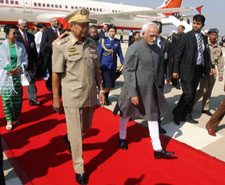
While the Indian vice-president has left for Burma (Myanmar) with a four-day official visit to the military-ruled country, the civil society groups of India have come forward for the cause of democracy in the Southeast Asian country.
A memorandum has been prepared for submission to the Indian Prime Minister Dr Manmohan Singh on Saturday, where it is observed that India being the largest democracy 'needs to look beyond' the bilateral relations and 'bring in the values of peace, justice and human rights in Burma'.
Mentionable that the vice-president M. Hamid Ansari had arrived in Rangoon, the former capital of Burma on February 5 with a delegation representing Indian diplomats and businessmen. The first Indian high-level official to visit Burma in 2009, Hamid Ansari had already gone for wide range of discussion with his counterpart Senior General Maung Aye in the context of increasing engagement between two neighbouring countries.
Various Indian civil society groups welcome the goodwill trip of Hamid Ansari to Burma in the perspective of the long standing historic and cultural relationship between the two countries. The role of India in promoting and restoring peace, harmony, fraternity and stability in the region is also appreciated by the groups in the memorandum.
"We are aware that Burma is one of India's critical strategic partner and biggest neighbour which shares 1650 kms border. And we appreciate the present relations of the two governments which have reached to the utmost level since a Treaty of Friendship was signed in 1951," said in the memorandum.
New Delhi's decision to promote Burmese people's capacity, knowledge, and experience and technology know-how by signing series of bilateral MoUs was meant for the development of bilateral and regional relations, it added. Forwarded by Burma Centre Delhi, the memorandum is supposed to be submitted to the President and the External Affairs minister of India too.
Meanwhile, in an official statement during a banquet hosted by the Burmese Vice Senior General Maung Aye in Rangoon on February 5, Hamid Ansari had declared that the economic engagement between the two countries had expanded to embrace both the public and private sectors. Several positive developments had taken place recently in the areas of trade, investment, power, oil and natural gas, manufacturing, IT and the vocational training sectors, he added.
The memorandum stated that the people of India feel disturbed that New Delhi 'being the world's largest democracy and a country that continually believes in the virtue of ethics, democracy, equality and human rights' had ignored its initiative 'to promote its own ideologies to the Burmese people' who had been desperately yearning for their goal for more than two decades.
The memorandum concluded urging New Delhi 'to bring in Indian humanism and democracy system to the people of Burma and assist them in their struggle for restoration of peace, human rights and democracy. It also appealed the union government to review the foreign policy in favour of peaceful transition of Burma in to a democratic state.
|
|


Comments: